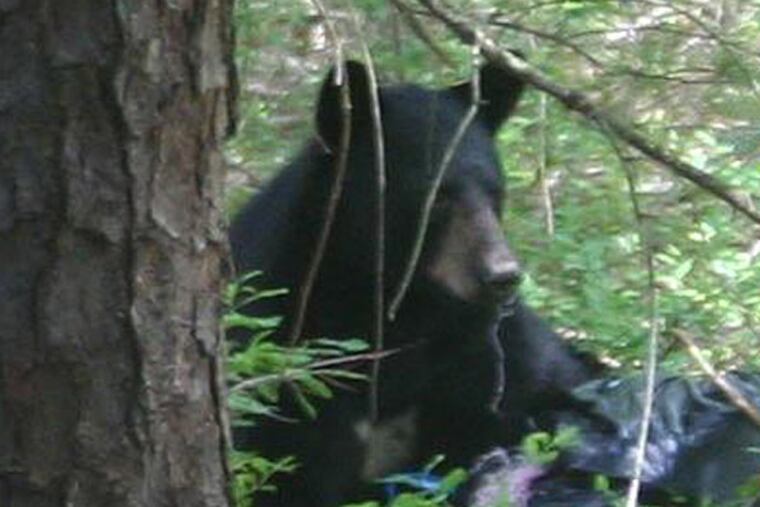Protests set as N.J. bear hunt nears
As New Jersey's fourth consecutive bear hunt begins Monday, state game officials say the hunts have helped stabilize a growing population and seem to be culling the most troublesome bears.

As New Jersey's fourth consecutive bear hunt begins Monday, state game officials say the hunts have helped stabilize a growing population and seem to be culling the most troublesome bears.
Animal protection groups, however, continue to question the accuracy of the department's data and have not quelled their criticism of the six-day hunt, or the practice of bear-baiting.
The hunt, which begins before dawn, will take place in parts of Sussex, Warren, Morris, Bergen, Somerset, and Hunterdon Counties. Hunters, who must have permits, are limited to one bear for the season. Protests of the hunt are planned for Monday and Saturday at the Whittingham Wildlife Management Area in Sussex County.
Last year, calls to the state Division of Fish and Wildlife about the most serious bear incidents fell by 40 percent, after declines of 15 percent in 2011 and 8.5 percent in 2010.
This year through November, "category one" calls - including for dog attacks and home and vehicle entries - were up 3 percent.
"It appears the category-one bears were the ones that were bolder and more likely to be hunted," said Larry Hajna, a Department of Environmental Protection spokesman. Many of those bears, he said, have been taken out of the population.
Officials believe 2,500 to 3,000 black bears live in New Jersey's "bear country," Hajna said - the region north of Route 78 and west of Route 287. A statewide population estimate is not available, though bears have been spotted in all 21 counties - including one sighted last summer near the Moorestown Mall.
The bear population was estimated at 3,400 in 2010, as the hunt resumed.
"Our ultimate goal is sustainability of the population. That's exactly what we're achieving," Hajna said.
As of Thursday, the state had awarded 6,445 of a maximum 10,000 permits for the hunt, Hajna said. The number of permits issued has declined since 2010, when the state gave out 7,893, according to Fish and Wildlife statistics. That year, 592 bears were killed, compared with 287 last year.
The state's black bears numbered just 100 in the mid-1900s, according to Fish and Wildlife.
The state allowed limited hunting from 1958 to 1970, closing the season after assessing the status of the bear population.
The population grew in the 1980s, and the state allowed hunts in 2003 and 2005 after determining the level of conflict between humans and bears "had become untenable" in North Jersey, according to the division's black bear management policy.
The policy, adopted in 2010, recommended the establishment of a regulated hunting season "to begin to reduce the bear population in the most efficient, cost-effective manner."
Animal-rights activists challenged the hunt and policy in court but were unsuccessful.
Susan Russell, wildlife policy director for the Animal Protection League of New Jersey, questioned whether the state had helped manufacture an uptick in reported human-bear conflicts to justify the hunt. Between 2007 and 2008, the number of category-one bear incidents jumped from 112 to 276, according to Fish and Wildlife statistics.
"It's almost too good to be true," said Russell, who believes hunters may have repeatedly called in complaints to inflate the numbers. Bob Martin, commissioner of the Department of Environmental Protection, has said the department reviewed the data and concluded a small fraction of calls may have been double-counted.
Martin has also said the department began outreach efforts around 2008 that resulted in more local police agencies reporting bear incidents to the state.
Russell, citing a University of Wisconsin-Madison study that found 10 years of hunting in that state had not reduced nuisance complaints, said New Jersey's hunt would not end bear-human conflicts.
The hunt "is not management," she said. "That's just random killing." She also said the statistics on complaints didn't account for context, including whether a person had food accessible to a bear.
Russell and conservation groups are pushing a bill in the state Legislature that would prohibit residents living in bear habitats from putting food outside unless it's in bear-resistant containers.
The bill, sponsored by Sen. Ray Lesniak (D., Union), also would ban bear-baiting - using food or other attractants to lure bears while hunting. Lesniak said last week he did not have enough support to pass the bill this session.
"Real hunters don't need to bait their prey into being sitting ducks," he said.
In addition to being unethical, he said, baiting spurs bears to venture into residential areas as they develop a taste for human food. "Baiting is unsafe for human beings," Lesniak said.
Hajna disputed that baiting threatened public safety. "The primary driver of bear-human encounters" is that "there's just more people living in bear habitat," he said.
According to a DEP survey, Hajna said, of hunters who successfully nabbed bears last year, 10 percent used bait. Russell said estimates from other states and surveys of deer-baiting in New Jersey suggested the percentage was likely higher.
On NewJerseyHunter.com, an online message board with 30,000 members, several hunters were addressing baiting Friday. "Making some yummy bear bait!!!" read one message, accompanied by a photo of bags of marshmallows, powdered Kool-Aid, and popcorn.
Frank Virgilio, state president of the New Jersey State Federation of Sportsmen's Clubs and a retired game warden who enforced the law when deer-baiting was illegal, said he found a very small percentage of hunters baiting.
Virgilio - who does not hunt bears - doesn't bait, either. "When I was 18 or 19, I did try it a couple times, and I found it was no more eventful than when I didn't," he said.
Still, "if someone wants to do what's legal, I don't have a problem," he said.